
RadenGoenawan was Attorney General of Indonesia from 31 December 1959 to 1962.

RadenGoenawan was Attorney General of Indonesia from 31 December 1959 to 1962.
Goenawan worked as Deputy Prosecutor General under Gatot Taroenamihardja. [1] On 31 December 1959, Goenawan replaced him. [1]
As prosecutor general, Goenawan oversaw the formation of the Bureau of Oversight for Faiths and Denominations (Biro Pengawasan Aliran Kepercayaan) and the expansion of the prosecutor's office into preventative, governmental, and security matters. [1] He also oversaw greater codification of the prosecutor's duties, with Presidential Decision Number 204 / 1966 passing on 22 July 1960, and Law number 15 of 1961 about the Fundamentals of Prosecution passing on 30 June 1961. [2] As part of this codification, he helped to design the logo used by the prosecutor's office and choose their uniforms. [2]
Goenawan was removed from office in 1962 for "blatant maladministration of justice". [3]

Gerhard Klopfer was a lawyer and a senior official in the Nazi Party who, as the State Secretary in the Party Chancellery, was Martin Bormann's chief deputy. He was also an SS-Gruppenführer. He participated in the Wannsee Conference that drew up plans for the implementation of the Final Solution to the Jewish Question. He subsequently denied all knowledge of the Holocaust and never was prosecuted.

Guided Democracy, also called the Old Order, was the political system in place in Indonesia from 1959 until the New Order began in 1966. This period followed the dissolution of the liberal democracy period in Indonesia by President Sukarno, who centralized control in the name of political stability. He claimed to have based the system based on the traditional village system of discussion and consensus, which occurred under the guidance of village elders. On the national level, however, this meant centralized rule under Sukarno: martial law, a massive reduction in civil liberties and democratic norms, and the Indonesian National Armed Forces and Communist Party of Indonesia acting as major power blocs.
Daniel Saul Lev was an American political scientist and scholar on Indonesia.

Hans Bague Jassin, better known as HB Jassin, was an Indonesian literary critic, documentarian, and professor. Born in Gorontalo to a bibliophilic petroleum company employee, Jassin began reading while still in elementary school, later writing published reviews before finishing high school. After a while working in the Gorontalo regent's office, he moved to Jakarta where he worked at the state publisher Balai Pustaka. After leaving the publisher, he attended the University of Indonesia and later Yale. Returning to Indonesia to be a teacher, he also headed Sastra magazine. Horison, a literary magazine, was started in July 1966 by Jassin and Mochtar Lubis as a successor to Sastra, and was edited by Taufiq Ismail, Ds. Muljanto, Zaini, Su Hok Djin, and Goenawan Mohamad. In 1971, Jassin was given a one-year prison sentence and a two-year probation period because as the editor of Sastra, he refused to reveal the identity of an anonymous writer who wrote a story which was considered by the court to be blasphemous.

Soepomo was an Indonesian politician and lawyer who served as the country's first Minister of Justice from August until November 1945 and again from December 1949 until 6 September 1950. Known as the father of Indonesia's constitution, he was posthumously declared an Indonesian National Hero by President Sukarno in 1965.

Mr. Gatot Taroenamihardja was Indonesia's first attorney general.

Besar Mertokusumo was an Indonesian advocate, said by Daniel S. Lev to be the first.
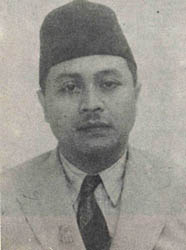
Prof. Mr. Abdoel Gaffar Pringgodigdo was the Minister of Justice of Indonesia from 21 January to 6 September 1950.

Hazairin was the Indonesia's Minister of Home Affairs from 30 July 1953 to 18 November 1954, serving in the First Ali Sastroamidjojo Cabinet.
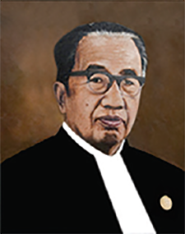
Wirjono Prodjodikoro was the head justice of the Indonesian Supreme Court from 1952 to 1966.
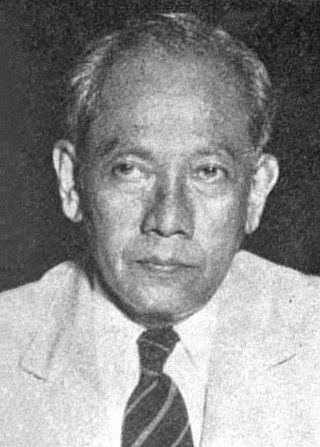
Soeprapto was the fourth Attorney General of Indonesia. Born in Trenggalek, East Java, Soeprapto studied law in Jakarta, finding work in the legal system soon after graduating in 1920. After transferring often, in the early 1940s he reached Pekalongan and became the head of the court for Native Indonesians. Escaping Pekalongan during Operation Product with the help of a prisoner he had just sentenced, Soeprapto made his way to Yogyakarta and began to work as a prosecutor. When the government moved to Jakarta in 1950, Soeprapto went with it. In January 1951, he was selected to be Prosecutor General of Indonesia, serving until 1 April 1959.

Kanjeng Raden Mas Tumenggung Wongsonegoro, more commonly known simply as Wongsonegoro, was an Indonesian politician, who served as the Deputy Prime Minister of Indonesia, alongside Zainul Arifin under Prime Minister Ali Sastroamidjojo, and the Governor of Central Java during the Indonesian National Revolution. He also served as minister in the Indonesian government several times, including as Minister of Home Affairs, Minister of Justice, and Minister of Education.

Moeljatno was an Indonesian prosecutor and professor. He also served as Minister of Justice from 24 March 1956 to 9 January 1957.

Dr. Sahardjo LL.B., was a National Hero and Minister of Justice of Indonesia during the First, Second, and Third Working Cabinets.

Raden Agustinus Suhardi (1899–1988) was a professor at Gadjah Mada University and fifth Agrarian Minister of Indonesia.
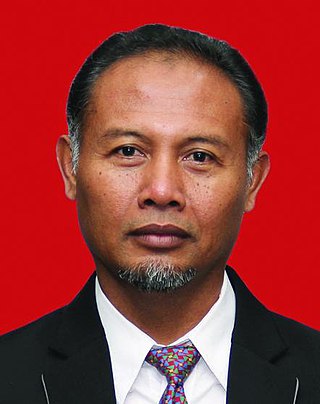
Bambang Widjojanto is an Indonesian human rights activist. He is the co-founder of the Indonesian Legal Aid Foundation and a "leading advocate for the rights of the indigenous peoples of West Papua". According to The New York Times, his work for indigenous peoples made him "the target of repeated threats and detentions by the Indonesian government".

Sartono was an Indonesian politician and lawyer who served as the first speaker of the People's Representative Council (DPR) from 1950 until 1960. Born to a noble ethnic-Javanese family, Sartono studied law at Leiden University. During his studies, he joined the Perhimpoenan Indonesia association and became an advocate for Indonesian independence. After graduating, he opened a law practice and helped found the Indonesian National Party (PNI) in 1927. When several party leaders were arrested by the colonial government in 1929, he became one of their defense lawyers and unsuccessfully argued for their acquittal. Following the arrest of its leaders, PNI became paralyzed and the party subsequently suspended its activities. In its place, Sartono founded a new political party, Partindo, which sought to achieve independence through non-cooperation and mass action. Partindo lasted until 1936, when it decided to dissolve itself. After Partindo's dissolution, Sartono helped found another party, Gerindo, which advocated for the creation of an Indonesian parliament.

Mr. Tjung Tin Jan or Jani Arsadjaja was an Indonesian politician and lawyer of Chinese Indonesian origin.
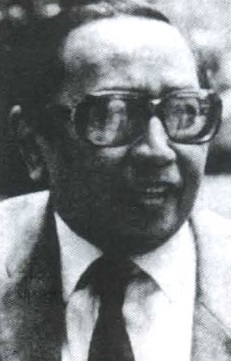
Suardi Tasrif was an Indonesian journalist, writer, and advocate. He became active in journalistic endeavors starting in the Indonesian National Revolution, and led the prominent newspaper Abadi during the Sukarno period since its founding in 1951 until its ban in 1960. He moved into advocacy during the New Order era, lobbying for legal reform in the Suharto regime's early years and becoming a prolific writer on legal and political matters. He has also contributed to the code of ethics of both the journalistic and advocacy professions in Indonesia.